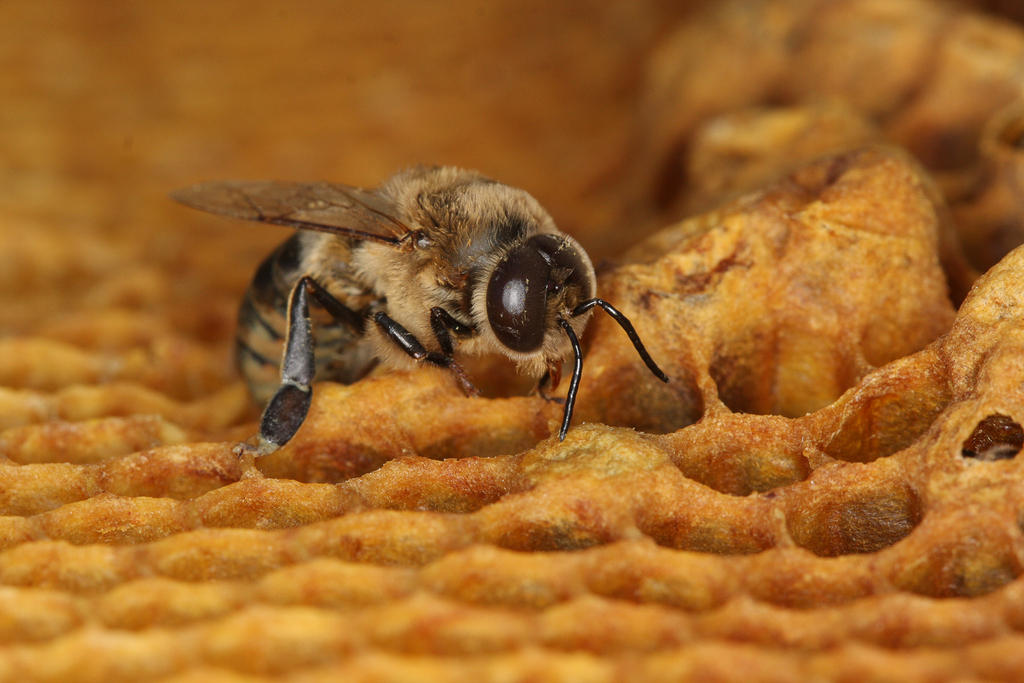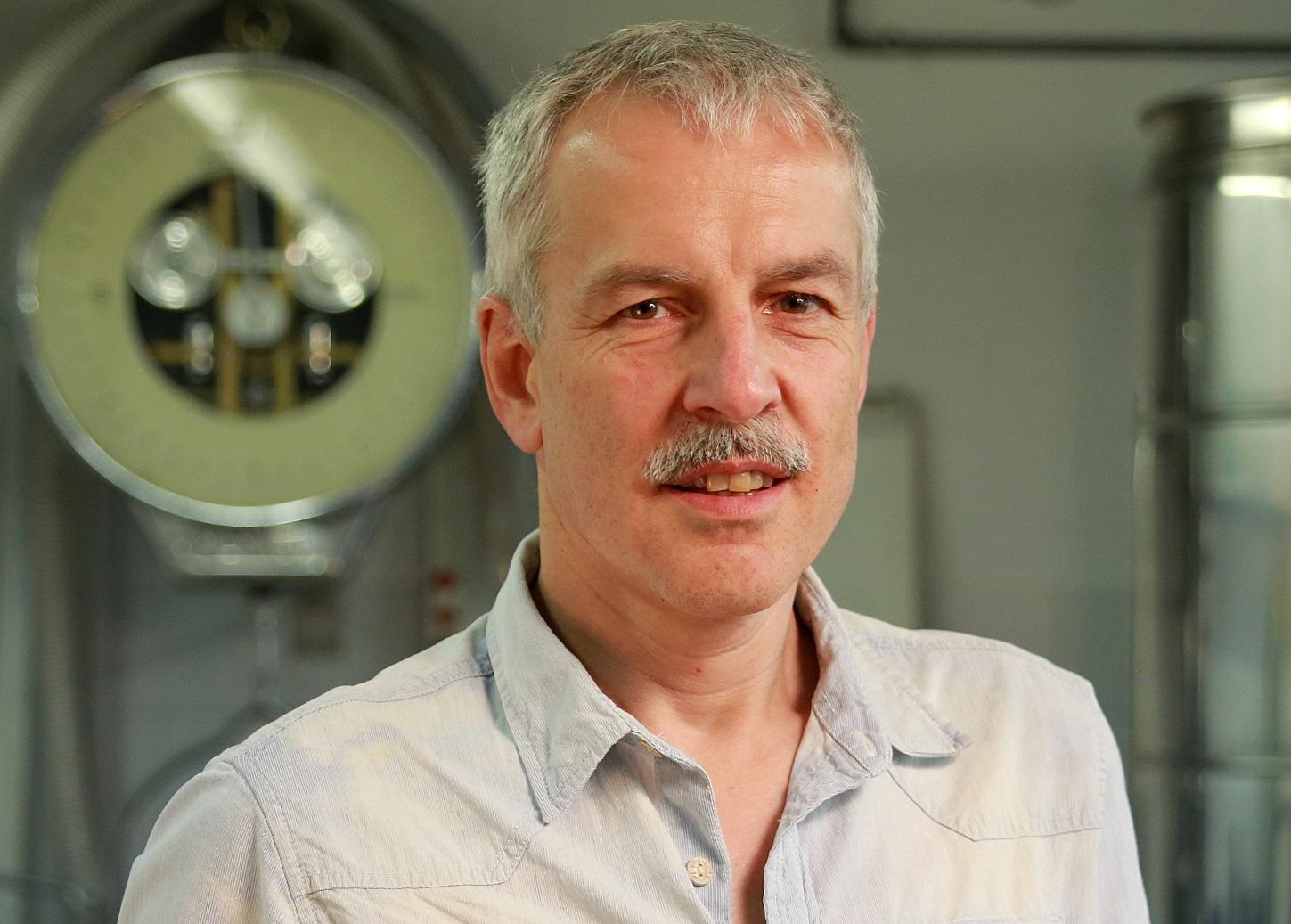
Swiss bee expert laments exaggerated focus on insecticides

The amount of time researchers dedicate to insecticides known as neonicotinoids is disproportionate, compared to the efforts invested in combating the honey bee’s greatest enemy, the varroa mite, argues Swiss bee specialist Jean-Daniel Charrière.
Charrière oversees bee researchExternal link at the Swiss government’s agriculture institute, Agroscope. Bees and other pollinators are vital to three-quarters of the world’s food crops but have been in serious decline in recent decades.
swissinfo.ch: Since 2003, annual bee colony lossesExternal link in Switzerland have averaged -16%, with a peak of -25%. Earlier this month, however, the Swiss bee association Apisuisse External linkannounced an excellent honey harvest nationwide. Should we be worried about the decline of bees in Switzerland?
Jean-Daniel Charrière: The situation varies from year to year. But in general, the existence of the Swiss honey bee is not in danger. Owing to beekeepers’ major efforts in replacing collapsed colonies, we still have around 165,000 bee colonies and a good density of bees in Switzerland. We recently published a report showing just 2-3 places – along Lake Geneva and in cantons Valais and Thurgau – where there could have a deficit of pollination, as there are lots of fruit trees and maybe a lack of pollinators.

There are lots of beekeepers in Switzerland, some of whom get discouraged and stop if they lose colonies over a period of several years. But we also see lots of new people wanting to start beekeeping. The quantity of honey bees in Switzerland is directly linked to the number of beekeepers, as there are few wild colonies, and the bee colonies are mostly looked after by beekeepers.
swissinfo.ch: Currently, there is a big focus among scientists, activists and politicians on the link between neonicotinoids and the decline of the bee (see infobox below). Are they the main cause?
J-D. C.: I think it’s important to be worried about neonicotinoids. But I think the amount of space given to them is disproportionate. We talk a great deal about pesticides as one of the causes of the winter losses, but there is no proof that they are one of the main causes.
For the honey bee, the primary cause of death is the varroa miteExternal link and viruses transported by it. Lots of studies confirm this. Systematically, they show that the presence of varroa is critical to determining whether they survive winter.
This doesn’t mean that pesticides have no impact. I can imagine that bees’ exposition to pesticides weakens their immune system, making them more susceptible to viruses, for example. But it’s a complex issue where several causes are involved, and they differ, depending of the location and the year.
swissinfo.ch: Neuchatel University researchers recently reported that 75% of honey from around the world contain traces of neonicotinoids. While the levels are below the legal threshold for European food, they say the results for bees were alarming, as a tiny concentration of pesticide of 0.1 ng/gram can have a significant effect. What is your view on this research?
J-D. C.: In the researchers’ paper in ScienceExternal link, the results are interesting and give a good overview about the exposure of the bees but the interpretation of the results goes too far. Personally, I wasn’t surprised that they found residues in honey. Afterwards the question is: ‘Is there a real risk for bees?’
I know quite a few studies that show that for honey bees colonies the risks are not that great. This is because honey bees are very resilient and able to react and compensate.
I rather fear for the other pollinators: the bumble bees and the 600 species of wild bees in Switzerland that don’t have similar compensation measures. The honey bee lives in a society. If some bees die, the colony has the capacity to react, and the queen bee can lay more eggs or the lifespan of bees can extend. But if a wild bee has only five descendants instead of 20, and this continues the following year, the impact is huge and the population can quickly diminish.
I think it’s very important to carry out studies into neonicotinoids but the quantity of studies being published is exaggerated right now. I don’t think this situation corresponds to the reality on the ground. We know that varroa is the main cause of bee deaths and the solution to treat the parasite is not optimal. We need to invest lots of money in finding a solution.
Right now, it’s easier to find funds for projects on neonicotinoids rather than varroa, which might take 6-7 years and are not guaranteed success.
swissinfo.ch: Since 2013, the EUExternal link and Switzerland have imposed restrictions on the use of some neonicotinoids, as they have doubts about their harmful effects on Europe’s honeybees. This moratorium will be reviewed at the beginning of 2018. Can we expect stricter rules, as some people predict?
J-D. C.: I can imagine that some use of neonicotinoids may disappear. But in my opinion, it’s wrong to impose a strict ban on all insecticides of the neonicotinoids group. I think you need to look on a case-by-case basis. In any case, the EU decision will influence the Swiss position.
swissinfo.ch: You say the problem with the discussion on neonicotinoids is that it’s black or white – you are either for or against them. The middle ground, which you assume, is not always understood in the beekeeper community.
J-D. C.: In general, beekeeper associations are against pesticides. This movement started in France where the debate is more virulent. It’s quite calm here in Switzerland. I’ve participated in sessions in France where the researcher has been booed if they present trial results objectively and don’t conclude that pesticides are toxic or dangerous for bees. It is considered bad research.
If you say you’re in favour of a reasonable use of pesticides, you are quickly accused of being someone who works for Syngenta or Monsanto.
Neonicotinoids, or neonics, are a relatively new insecticide that are widely used around the world. They work by attacking an insect’s central nervous system.
Environmental campaigners say the evidence of neonicotinoids’ harm to pollinators has grown stronger in recent years. Studies External linkinclude a field trial published in July that showed neonicotinoids damage bee populationsExternal link, not just individual insects, and a global study of honey revealing worldwide contaminationExternal link by the insecticides. In 2014 research in the Netherlands suggested that concentrations of a common neonicotinoid were responsible for a decline in certain species of birdsExternal link. A study in Germany also showed that 75% of all flying insects had disappearedExternal link since 1989 in Germany and probably much further afield. It suggests that pesticide use is one possible cause of this decrease of insects.
Agricultural groups such as Syngenta and Bayer, which produce neonicotinoids, challenge these studies and the recent negative coverage of neonicotinoid pesticides. Erik Fyrwald, chief executive of Syngenta, insists: “There’s plenty of data suggesting that neonicotinoids are not having any significant impact on bee health.”
Since 2013, the European Union and Switzerland have imposed a moratorium on the use of neonicotinoids on flowering crops. The European Commission now wants a total ban on their use outside of greenhouses, with a decision expected in January. The British government this month announced External linkit was in favour of tougher restrictions on neonicotinoids due to the ‘growing weight of scientific evidence’.

In compliance with the JTI standards
More: SWI swissinfo.ch certified by the Journalism Trust Initiative






























You can find an overview of ongoing debates with our journalists here . Please join us!
If you want to start a conversation about a topic raised in this article or want to report factual errors, email us at english@swissinfo.ch.